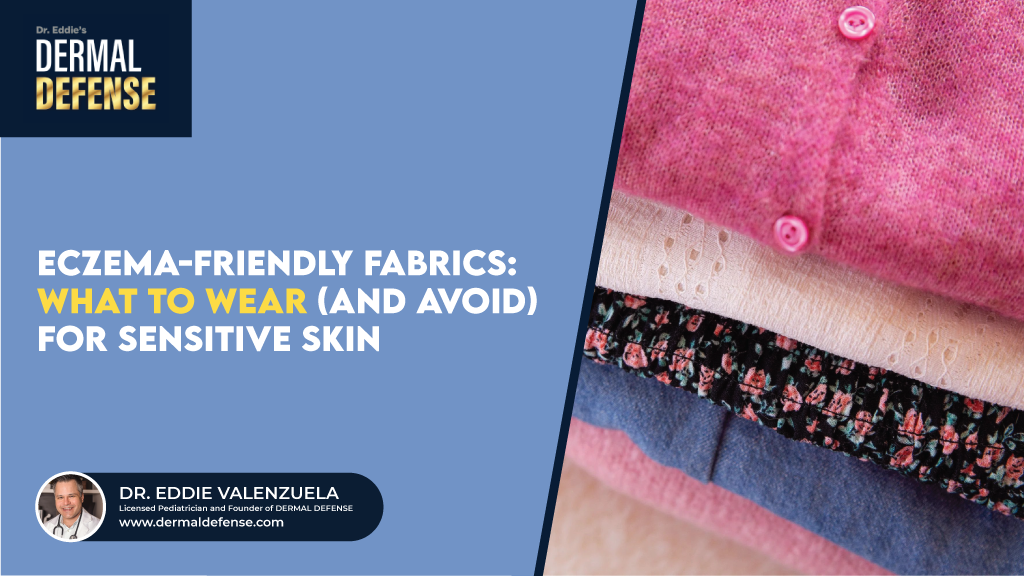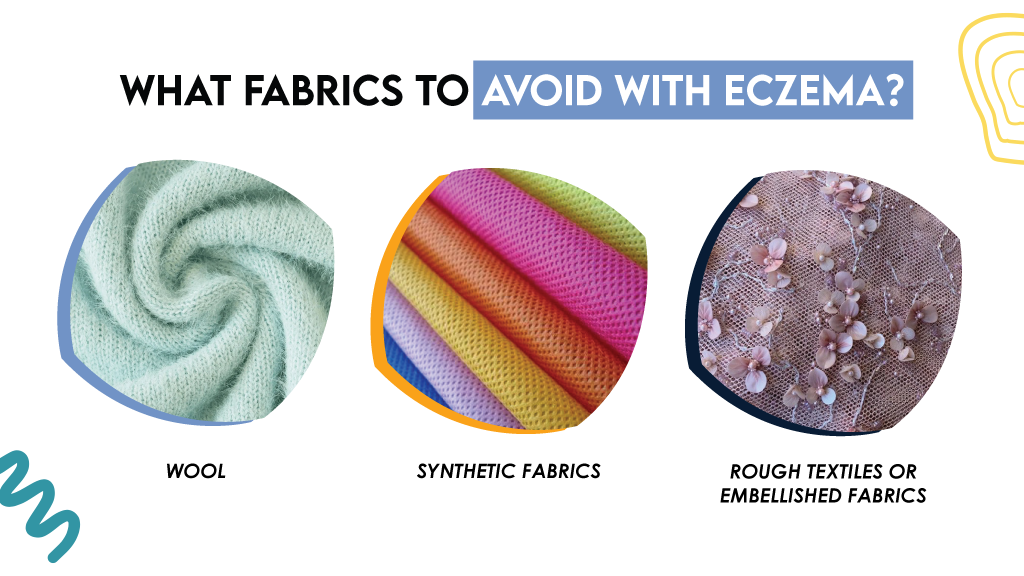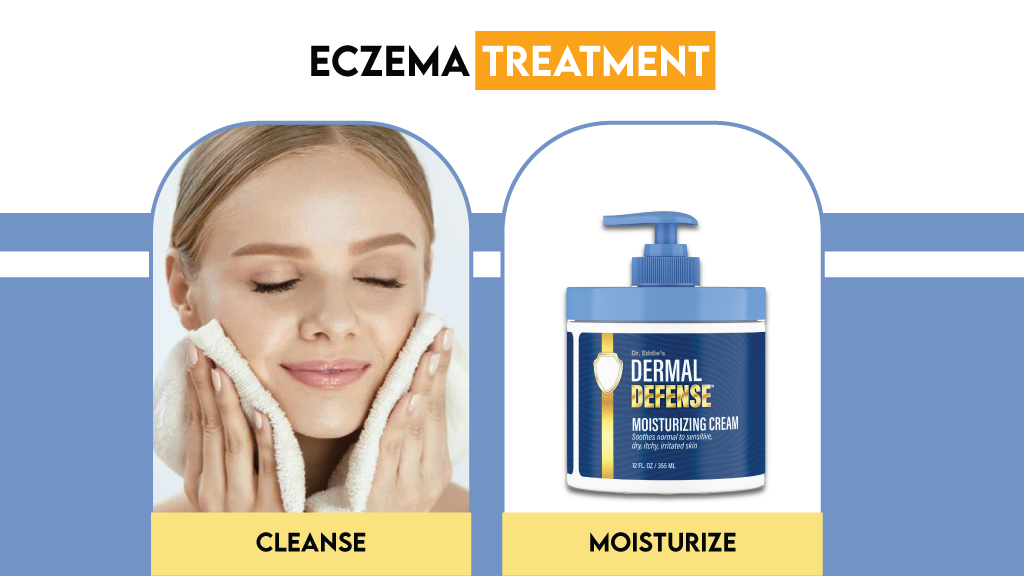Eczema-Friendly Fabrics: What to Wear (and Avoid) for Sensitive Skin

If you have eczema-prone or sensitive skin, you may have already noticed that certain clothes or fabrics can trigger a flare-up, causing itching and irritation on the skin. But can some fabrics actually make your eczema worse? The short answer is yes.
Clothes are something you wear every day, and they stay right next to your skin all the time. This is why it is essential to choose the right type of fabric for your clothes to prevent your eczema from exacerbating.
And if you are confused about which is the best fabric for eczema, then don’t worry; this blog can help you figure it out.
Can Certain Fabrics Cause Eczema?
Fabric is considered one of the most common triggers that can cause an eczema flare-up. As we discussed earlier, certain fabrics can exacerbate your eczema symptoms, but how?
When your eczema-prone skin reacts to certain fabrics or causes contact dermatitis, which is a type of eczema, it is known as fabric dermatitis or clothing dermatitis. A fabric can affect your eczema-prone skin in various ways:
- Rough or scratchy fabrics can rub against your sensitive skin and lead to skin irritation.
- Some fabrics can trap heat and sweat in them, creating a warm, moist environment that can make the itching worse.
- Harsh chemicals or dyes used while manufacturing the fabric can also cause a reaction on your sensitive skin.
- Static materials can pull on the skin’s surface and lead to dryness and irritation.
- Wearing tight-fitting clothes or fabrics can cause friction on the skin and further exacerbate the irritation.
You might be surprised how much a simple cloth or fabric can affect your eczema. But don’t worry, we have listed out all the fabrics that you must avoid with eczema and ones that are best for you.
What Fabric is Best for Eczema?

Now, let’s take a look at fabrics good for eczema and why they can work well for your sensitive, eczema-prone skin. According to the National Eczema Society, some of these fabrics are:
1. Cotton
When it comes to choosing the right fabric for eczema, cotton should be your first priority. Why? It is soft, breathable, easy to wash, and highly absorbent. However, when choosing the type of cotton, it is best to go for 100% cotton instead of a blend.
Cotton blends can contain some amount of polyester or chemicals that can irritate the skin.
2. Bamboo
If this question has ever crossed your mind: “Is bamboo fabric good for eczema?” the answer is absolutely yes. It’s because it is soft, breathable, thermoregulating, and has high absorbency and may contain some antibacterial properties.
The bamboo fabric that is most common among people with eczema is bamboo viscose, even though its manufacturing and processing are not very environmentally friendly. The fabric itself is great for people with sensitive skin.
3. Lyocell/TENCEL
Another eczema-friendly fabric is Lyocell, also known as TENCEL. It is usually obtained from wood or bamboo pulp. It is soft, breathable, and highly absorbent, and its properties are quite similar to those of bamboo.
However, its manufacturing process requires the use of fewer chemicals and does not produce any harmful waste, which makes it an environmentally friendly and eczema-friendly fabric.
4. Silk
Silk is another eczema-friendly fabric on our list. Silk is considered a natural material obtained from a protein called fibroin, which is produced by insect larvae when they spin their cocoons.
Silk is known for its softness, breathability, and body temperature-regulating properties. However, silk clothes are less practical than cotton or bamboo because they are difficult to wash, and eczema creams can often leave stains on them.
5. Modal
If you are thinking, “Is modal fabric good for eczema?” Well, it may not be among the top picks for eczema; however, some people find it suitable to be used on eczema-prone skin due to its softness, breathability, and moisture-wicking properties.
According to the Skin Centre of South Miami, plant-based modal fabric is a great option for people with eczema.
What Fabrics to Avoid with Eczema?

Now that you know which fabrics to go for while buying your clothes, let’s take a look at fabrics to avoid with eczema. According to the National Eczema Society, some of the fabrics you must avoid using as much as possible are:
1. Wool
Wool may sound like an excellent fabric for winter due to its warm and cozy feel, but for people with eczema, it is a big no. Wool can trigger an eczema flare-up or exacerbate an existing one because it can trap heat and moisture, which can further worsen the inflammation on the skin.
2. Synthetic Fabrics
Synthetic fabrics like polyester and nylon are non-breathable materials and can trap heat and moisture that can trigger an eczema flare-up. Also, they are often treated with certain dyes and resins that can further exacerbate the itching associated with eczema.
3. Rough Textiles or Embellished Fabrics
Rough textiles such as denim, hemp, linen, and corduroy, or fabrics with embellishments, can rub against the skin and cause irritation and micro-injuries on the skin.
What Fabrics are ok for Babies with Eczema?
If you are a parent, you might already be very careful about everything that you use for your baby. However, most of us often overlook the type of fabrics we are using. According to the American Academy of Dermatology, the fabrics that you must avoid at all times if your baby or child is experiencing eczema are wool and polyester, as these can trigger an eczema flare-up.
The fabric best suited for baby eczema is 100% cotton, as it is soft, breathable, and does not cause friction or irritation against the baby’s skin, which helps prevent the eczema from worsening.
Can Fabric Softener Cause Eczema?
If you are using the right fabrics for your eczema-prone, sensitive skin, yet still notice that your eczema is getting worse, then there are chances it’s the fabric softener or detergent you are using to wash your clothes that might be the culprit.
Most people often ask if fabric softener causes eczema. Well, technically, it cannot cause eczema; however, it can trigger an eczema flare-up. The harsh chemicals in these products can cause itching, irritation, and reactions on your skin.
So, which is the best fabric softener for sensitive skin and eczema-prone skin? A detergent or fabric softener that is fragrance-free, dye-free, sulfate-free, labelled as hypoallergenic, and eczema-friendly is best for sensitive skin.
Eczema Treatment

So choosing the right type of fabrics for your clothes is essential to prevent a flare-up, but how can you soothe one if you are already experiencing one? The best way to soothe the itching, irritation, and redness associated with eczema is to follow a proper eczema skincare routine.
Your routine should include the two essential steps:
Step 1: Cleanse
The first step is to cleanse your skin. Cleansing helps remove all the dirt, bacteria, and irritants from the skin that can make the itching and irritation on your skin worse. Some of these bacteria can also penetrate the skin, leading to skin infections.
However, make sure the soap, body wash, or face wash you are using to cleanse your skin is eczema-friendly. If you are searching for the best body wash for eczema, then try Dermal Defense Sensitive Skin Body Wash.
It is free from any of those skin-irritating chemicals, such as fragrances, parabens, sulfates, dyes, alcohol, and phthalates. Instead, it contains natural ingredients such as licorice root extract, aloe vera extract, and oat extract that help soothe the itching, irritation, and redness associated with eczema. Use it at least once daily to wash your skin or take a bath.
Step 2: Moisturize
The next step in your skincare routine should be moisturizing. Moisturize your skin with the help of an eczema cream at least twice daily, once in the morning and once before going to bed.
Apart from that, don’t forget to moisturize the skin after washing it. However, make sure to use a fragrance-free, hypoallergenic moisturizer like Dermal Defence Eczema Moisturizing Cream.
It is specially formulated by Dr. Eddie, an expert pediatrician, to help hydrate and nourish sensitive skin. It is clinically tested and doctor-approved to be safe for use on sensitive skin in people of all ages.
It contains glycerin and snow-white petrolatum, which help strengthen the skin’s natural barrier and lock moisture in.
Conclusion
Living with eczema means being extra careful of everything that touches your skin, even the clothes you wear. Certain fabrics, such as wool, polyester, nylon, and rough textiles, can cause irritation on your skin and trigger an eczema flare-up.
However, choosing the right fabrics can help prevent a flare-up. The best fabrics for eczema are 100% cotton, bamboo, TENCEL, silk, and modal. Apart from choosing an eczema-friendly fabric, it is also essential to use a gentle, fragrance-free fabric softener and detergent to wash your clothes. Choosing the right fabrics and fabric softener and following a skincare routine that includes the use of eczema skincare products by Dermal Defense can help soothe the itching, irritation, and redness associated with eczema.
FAQs
- What fabric to avoid with eczema?
The fabrics that you should avoid at all times if you have eczema-prone or sensitive skin are
- Wool
- Polyester
- Nylon
- Can cotton make eczema worse?
Cotton, in general, is considered safe and skin-friendly for people dealing with eczema. However, blended cotton may contain polyester or other types of fabrics that may irritate the skin.
- What fabric is best for sensitive skin?
Some of the best fabrics to use if you have sensitive skin are:
- Cotton
- Bamboo
- TENCEL
- Silk
However, 100% cotton is considered the best and safest for people with sensitive skin.
- What clothes are best to wear with eczema?
If you have eczema, try wearing clothes that are made with soft, breathable, moisture-wicking fabric and are loose-fitting.
- Eczema and the Immune System: Is It Autoimmune or Immune-Mediated? - February 18, 2026
- Eczema on Black Skin and Other Skin Tones: How It Looks, Symptoms, and Diagnosis - February 18, 2026
- The Link Between Eczema and Allergies: Triggers, Atopic March, and Managing Flare-Ups - February 18, 2026
